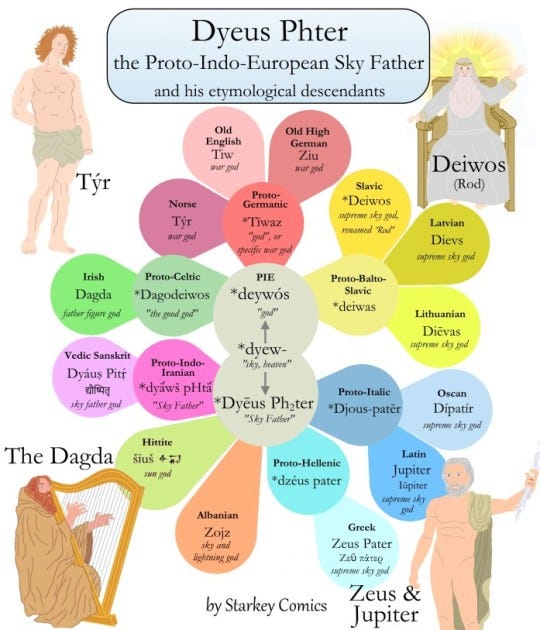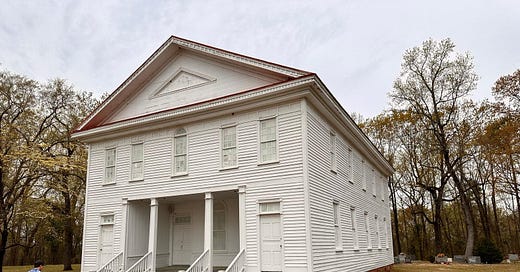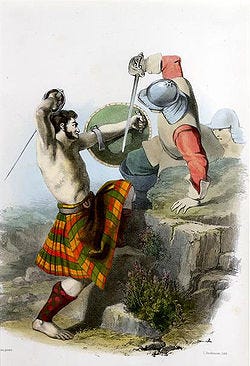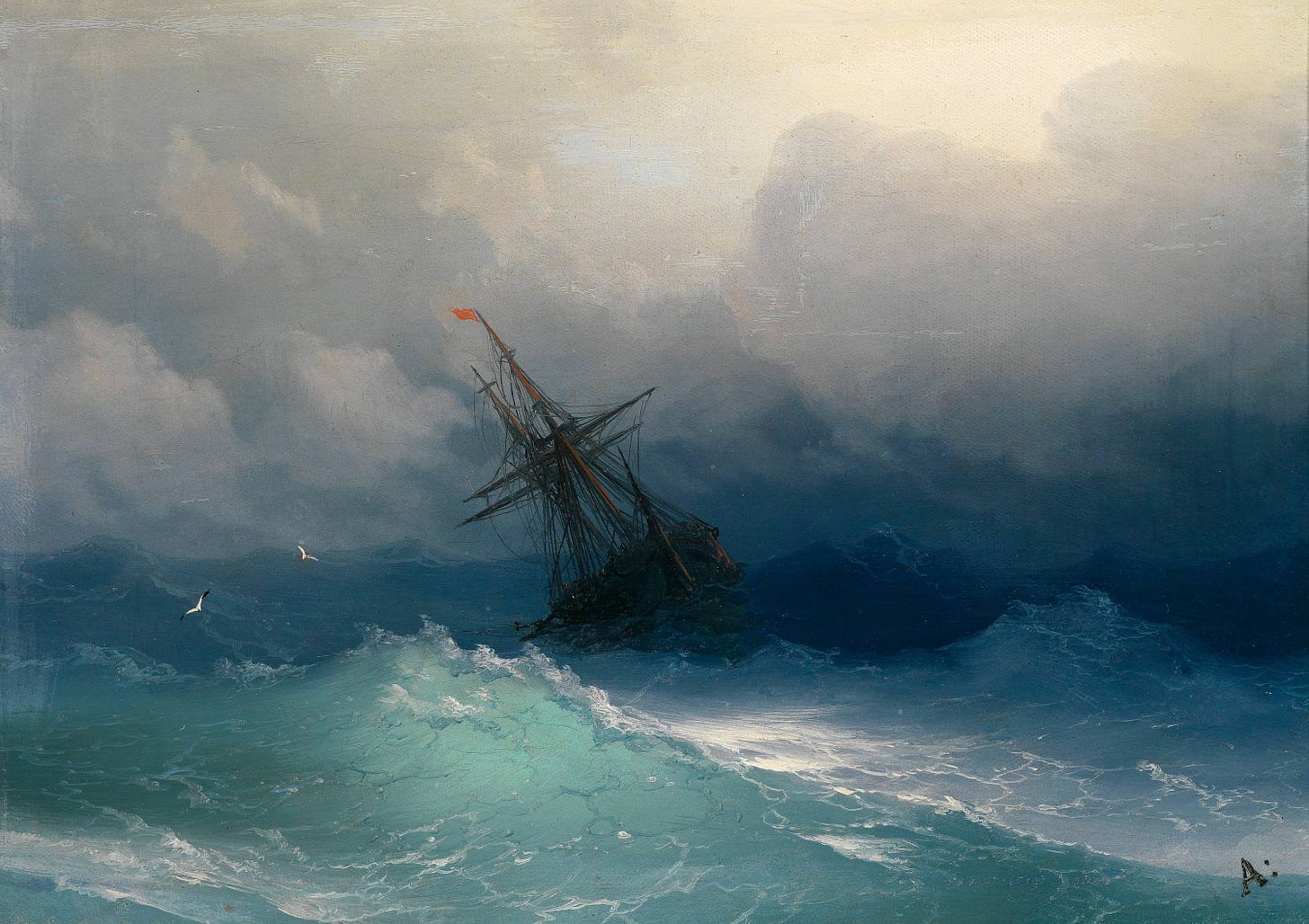I said this in the Notes recently, and I will be defending this statement in the article:
You shouldn't abandon family for a teacher from the Levant. If that's the price to pay then it's too steep.
Goodly Christian ‘stacker
recently asked me this in the Notes:I've wanted to ask you this for a long time. Why not? What is the justification for family and ethnicity being good in itself and what is the epistemology behind proving that. I value family because it's 1. A moral law from God 2. Leads to prosperous and harmonious societies and 3. Because it's part of my nature which is inherently good and crafted by God. I know all these things by the observation of God in history and the metaphysical necessity of God. But what I don't understand is how you can have any of this on a pagan framework since your gods don't give you any moral dictums, aren't necessarily good or creators of everything and aren't historical entities. What reason do you have to follow any which god, and how do you even know they are the true god (since only people who believe in the ethos record their stories.) A big part of why I'm a Christian is because I need to justify these things to myself and others. I would sincerely like to hear your opinion on this.
My response was long, so I decided to make a short post in response. I will probably be making a longer post either this week, or the next, to respond to
and his critiques of the Ancestral Principle. I may not, because I am getting to be really busy these days and I don’t have time to do everything that I would like to do.To be clear about things, I follow the ancestral household religion as outlined by W.E. Hearns, and which is found in every single Indo-European pagan religion stretching from Ireland to India, from the Early Bronze Age to the Medieval pagans of rural Europe. Since this religion was once encoded into law in every ancient European society, it ended up being largely grafted over into Christian legal systems and was maintained in a purely legal sense for property rights and inheritance, with religious rites being mostly outlawed.
This ancestral household religion was very important to pagans converting to Christianity, we can even see Christian kings maintaining their idealized lineages to Odin, Ingui Freyr, Nuada, and many more pagan Gods. We also see pagans from Ireland to Frisia refusing to convert due to perceived rejection and damnation of their honored fathers, famously with King Redbad of Frisia. We also see many druids intellectually and spiritually resisting the missionaries, and they even duke it out with many magical battles in the hagiographies of Ireland, Scotland, and Wales. Of course, the druids lose in the stories, but what isn’t told is that many of them converted into the next generation of monks and saints, hence the strange syncretisms brought into the early Celtic church. My own clan is deeply tied to these syncretisms, due to the fact that this ancestral household religion was partially grafted into Christianity. From fairy springs to festivals and holidays, to the names of the weeks and months, and to the very words we use to describe gods and divinity, this ancient paternalistic religion is present with us even now in a largely secular world. That is how powerful this ancestral foundation truly is in the lives of Europeans and all that we touch.
This is the foundation of the pagan religions which we tend to associate more with the established pantheons led by Odin, Zeus, or the Dagda. Before we were identifying Gods and Goddesses as our ancestral creators, we were animistic, and this animism developed into a household religion based around the worship of fathers. It is obvious how this paternalistic household religion spawned the later developed mystery cults and Imperial Religions of the Indo-Europeans. I also believe that the Old Testament and the Israelites were utilizing this very paternalistic system through syncretisms with all ancestral groups they mixed with over the years. This led to them having a religion focused on descent through Adam, to Noah, to Abraham, and down through the ages until we end up with Cohens and other unseemly creatures with Semitic ancestry who likewise claim descent from such ancient folk.
We often debate about identity in our circles. Well, we often talk about belonging to some people, to some group, to some identity. This belonging is ownership, and I know exactly who has ownership over my life — the All-Father, and my ancestral patriarchs. I do not belong to a Semitic folk — instead, I come from the Clan MacMillan1 who come from a specific line of people who come from a specific folk that can be identified genetically, archaeologically, and often times even with written historical sources. Since we are paternalistic and patriarchal no matter our religion, it would be correct for me to identify first with my actual fathers, rather than pretend spiritual fathers from other groups. My respect for other honorable men is not the same as my reverence for my fathers, which is something both modern Christians and pagans struggle with, to be honest.
My answers will vary compared to other pagans because we are not a monolithic religion — we have different fathers, and we observe nature according to the gifts allotted to us. We have near-endless nuance between each other due to a myriad of reasons, primarily based on our specific ancestry, or loyalty to certain ancestral tribes. A German pagan will respond vastly different than a Greek, and I will not respond exactly like either one, for I am ultimately much more Gaelic in my outlook than the rest. However, I am not a Bronze Age or Iron Age Gael; I am a 21st century American of Scots-Irish ancestry.

Bulba first asks:
Why not? What is the justification for family and ethnicity being good in itself and what is the epistemology behind proving that.
There is a lot of nuance in how pagans view blood. Family and ethnicity are not good in and of themselves, but their source must be identified, for that is the whole point of cosmology and creation stories — they are meant to explain our creation and purpose. Our spirits and bodies, our families and tribes, these things are given to us by our ancestors, which stretch back to identified Gods which were worshiped far longer than 2k years like Christianity. These ancestors are the actual source of our lives. I can prove for a fact that I come from a specific line of people, and share specific traits with various ancestors of mine. I can prove for a fact that I inherited the same spirit as many of my forefathers, evident in personal hierophany which led to my conversion. Furthermore, my own name Aidan was given to me because of St. Aidan of Lindisfarne, but the name itself descends from an epithet of the Dagda, the Good God of Druids, also known as Aed, the Fiery One (ironic). This God is very important to me, for he is the Eochu Ollathair, and I call on his name often whenever I am by a body of landlocked water, like a pond or lake. He is also someone I think about when I work with horses and cattle, something I do often on the farm.
But, why is family important? Because my civilization and ethnos is, and always has been, staunchly patriarchal and clannish, and I come from a specific line of men who are traced back in written history to the Gaels, who worshiped Gods they had bona fide faith in and who were recorded in various tales by Christian monks, bards, and brehons of the same tribes and clans, and who have clear analogues with related pantheons, and clear predecessors in older tribes. I can name most of my ancestors going back to pagan times, because the Gaels were very keen on recording clannish information, even as Christians, and my specific line probably goes to a euhemerized tribal god of the early Gaels, similar to many other clans. This religion is provably older than Christianity. It also comes from my ancestors, and is not from Israelites. Prior to this religion and ethnos, written history fails us and we must turn to archaeo-genetics and comparative mythology. This provides us with deep insight into the Indo-European religion/culture of the Bell-Beakers and their predecessors and contemporaries, the Corded Ware. Further back, we can reconstruct a very barebones Proto-Indo-European religion, but beyond from that we lose track. However, I am not reconstructing this religion. Still, let us look further back.

The Proto-Indo-Europeans come from older hunter-gatherer and farmer groups. Old Europe clearly developed out of even older cultures. We can see development of ancient cultures from the hunter-gatherers who made Gobekli Tepe, extending down through history until we reach early farmers who took up their own megalithic tradition across the Mediterranean and Western Europe. We can see an even older line through the Paleolithic cultures who are the direct ancestors of all later European cultures. There really isn’t much to say here though, these primordial Stone Age cultures are far older than Israel or even the Middle East cultures which precede Israel, and have direct genetic continuity with each other in the majority of cases.
We clearly cannot observe the religions of Paleolithic ancestors, or Early Farmers or Hunter-Gatherers, but anthropology has been capable of identifying many aspects of their symbolism and practices which ended up in the later Indo-European religions. This is the chain of genetic, cultural, linguistic, and spiritual history that Europeans like myself are provably and factually tied to on a very real level. We come from specific people, and we have more responsibility towards ancestors than foreigners. Abraham has nothing to do with me, neither does Jesus. The only thing they have to do with me is a section of my ancestry which decided to break oaths and make covenants with Jesus. This does not change factual history about my existence, or the history of our civilization. The Bible barely touches on any of this real genetic and archaeological history, that’s because we have a far closer connection to the ancient cultures of Europe than we ever will to the people mentioned in the Bible.
The dead can’t speak. We must speak for them, and the majority will never lie with Christians. I must defend the foundation of our civilization, and the source of many of our words, names, practices, ideas, and traditions. I must defend this because it is the ancestral spring that will forever have shaped our lives and histories for the better. Our ancient religions changed with our legendary histories, because it was paternalistic and followed fathers and their households, accumulating experience and knowledge as time goes on. That is tradition, in my eyes. I revere Christian ancestors who were worthy due to their honorable deeds in life, and I also have some pagan ancestors who I do not revere because they were not honorable; but I will speak of all of these ancient men and women with greater respect than I could ever speak for Abraham, Jacob, or Jesus and his disciples. I respect some Biblical characters due to my familial loyalty and some honorable Christian forefathers, but I have more respect for those Christian forefathers than the figures they worshiped. I can tell by their names and actions that the pagan past was present in their hearts, and didn’t go away even extending to me, a man who is a new turning of the leaf on this ancestral tree.
Christians cannot claim European greatness. Europeans can claim greatness though, and we have foundational ancestry which is more important to our actual lives than anyone mentioned in the Bible. This is a fact that Christians cannot accept because of their understandable dogma towards Jesus. I do not begrudge those their dogma to their teacher from the Levant, but I can assure all Christians that my piety towards my fathers is not something that I have the right to turn away from. Oaths were made in the primordial past, and the Gods of our fathers have largely upheld their end. I am just observing those prior oaths and obligations, taken long before Jesus ever came to the scene. Of course, Christians will say that pagans cannot claim all of this greatness, nor can we claim authority since our religion appears to be constantly fluctuating, but that ignores the entire argument — Europeans are the source because our ancestors are the source, and authority lies with reality, which is a living experience. Therein lies the nuance of the Ancestral Principle, in my eyes.
Bulba goes on to say this:
I value family because it's 1. A moral law from God 2. Leads to prosperous and harmonious societies and 3. Because it's part of my nature which is inherently good and crafted by God. I know all these things by the observation of God in history and the metaphysical necessity of God.
Most of this also applies to pagans due to our specific cosmologies and mythologies. Also, pagans do have moral dictums, many more than Christianity, for the pagan religions were encoded into the legal systems of ancient Europeans, and there are many different pagan religions and legal systems. In the ancient past, moral law and legal law was heavily coded with the pagan religions of the respective cultures. For example, in the Brehon Law for the Gaels, it was clear that many pagan things were carried over into Christianity strictly because these did not contradict Christian moral dictums, such as marriage practices or duties owed to the clan and tuatha. However, the Brehon Laws also allowed for many things which were later deemed heretical, and this caused lots of tension when the legal system was changed. Similar events happened with the Anglo-Saxons, Visigoths, Frisians, and countless others who had their legal codes shifted from the native pagan religion to the new Christian one — and these changes all point to the same thing, this being the changing moral dictum. Clearly, there were moral dictums for the pagans. Christians are just unaware of them, or think they are all lost to time. Or, perhaps, since some dictums are lost then the rest that we have are useless? I do not know, but it seems ahistorical to me.
There is a need for a comprehensive list of usable texts for pagans and a defense for why we use them — this will come in the future, when I have more time. The heroic epics, or even ancient ethnographers, cover the moral dictums of many pagan tribes. Their customs, laws, and traditions were their dictums, and these were encoded into song and legend. We cannot know each law and custom, but we can know much more than Christians seem to realize. The Brehon Laws have been studied. The Germanic tribes and Gaulic tribes have been studied. What can be known has been largely uncovered, and now it is left to us to grasp the knowledge that is available through research. I personally read Gaelic bardic poetry to see the actions of the pagan heroes, and through comparative mythological studies, I can clearly outline the basics of this religion.
It is not some grand mystery. The noble virtues, coupled with many practices associated with hospitality, warfare, and poetry paint a clear picture of what is required of a modern pagan. We must honor the dead, care for the living, and provide for future descendants — we must carry on our cultures into the future and add to them with piety and courage, and we must defend our people from foreign attack. Our household is like our ship, and we must maintain it well as we sail across the waters, lest we lose ourselves utterly and forever.
Bulba finishes the comment with this:
But what I don't understand is how you can have any of this on a pagan framework since your gods don't give you any moral dictums, aren't necessarily good or creators of everything and aren't historical entities. What reason do you have to follow any which god, and how do you even know they are the true god (since only people who believe in the ethos record their stories.) A big part of why I'm a Christian is because I need to justify these things to myself and others. I would sincerely like to hear your opinion on this.
My sincere and bona fide faith is that the Gods are real entities. They are surely historical! Not only do we have written material speaking about them, but we have tons of archaeological evidence, and I have hierohany and theophany to speak about from modern practitioners. What a bizarre thing to say… of course I have real spiritual faith in my Gods, similar to a spiritual faith in Jesus. I don’t see why it is so hard for Christians to relate to other faithful Europeans. Bona fide faith is supposed to be a major part of the Western legal system, or at least, free-speech lawyer Douglas Christie sure makes a convincing argument that bona fide faith must be taken seriously. It also seems that Christians should understand the arguments I am making here about bona fide faith, surely they understand it in the Case of Malcolm Ross2.
What reason do I have to follow the Gods that I follow? My ancestors, and my observance of the factual history of my people, which is not tied to the Old Testament, but is instead tied to the Indo-Europeans of legend. Instead of relying on Israel, I rely on Europe. This is elementary with people like me.
How do I know my Gods are true? Because they act in my life, and I have been convinced through hierophany coupled with the observance of history and nature. If Christians would like specifics, I will only be vague and mention wealth and fertility rituals which have worked, along with specific events in my life which won’t seem important to other people. Personal experience never convinces anyone, right? Ah, Christians like it when it’s about Jesus, but if it is about the Old Gods… well, it has to be fake, or questionably Satanic. .
Christians do not have a monopoly on hierophany.
At the end of the day, the justification is creation itself — the ordered cosmos that I was born into. When I observe nature and history (my religion is one of observance, not revelation or textual dogma) I come to various conclusions based on experienced hierophany and logical tautologies. This is something that pagan wisemen were known to partake in, ranging from the Greek philosophers to the Celtic druids. Again — my justifications come from an acceptance of nature and using experience and logic to make sense of the cosmos. Christian justifications largely originate with textual dogma, which ultimately descends from a foreign people, and has been heavily syncretized with various types of pagan religions. Most Christians claim the Trinity is the proper way to view the Creator, some have different takes, and modern jews of course only care for Yahweh. Ancient Israelites had different takes than all of these Abrahamics, depending on the time period they were even polytheists. Here we see the nuance, even in the Abrahamic world — perhaps textual and denominational dogma is not as good as factual observance of reality?
I keep thinking about this justification issue with Christians. Christians admittedly need to justify their religion to themselves and others ( a major part of the religion is spreading the faith, which requires making these justifications to non-Christians), while I really don’t have a hard time just observing reality and coming to a conclusion based on personal hierophany and provable facts about reality, and logical tautologies which are consistent with this religion. Christians do this all the time, too, albeit based in textual dogma as their foundation.
We live in the cosmos, and it has a real history, and it is not perfectly encoded into any one system. Nature is the creation of the Creator, and we must adhere to that regardless of any specific beliefs of any of our ancestors. If our ancestors align with nature, then we can affirm them, but if they are not honorable and true, then we must have some nuance and scrutiny. We must never hate our ancestors for being wrong, be they pagan or Christian, for the dead cannot speak, and we are their voices. Who else will speak for your specific dead ancestors? No one will ever be capable of loving and respecting them the way that you could, and therein lies the responsibility and familial duty I am always harping on about. Again, the dead have no voices. We must speak for them.
That is my dogma. I understand that Christians feel the same towards their own bona fide faith. I hope that I have helped explain some of the pagan world, which is all-too alien to modern people. It really doesn’t have to be since pagan ideas are encoded into European civilization at its very core — even Christians seemed to grasp this wisdom not that long ago, before the church was totally gay and judaized.
Hail the Gods! Hail the ancestors! Hail victory! Thank you, and good-end! o///
The Clan MacMillan
Millan, deserving of the warmest praise, as full of worth and virtue as of days, brave, open, generous ‘tis in him we find a solid judgement and a taste refined.








Very good
This was perfect. One thing i hear christians say is their god created everything, the universe, nature, etc. What is their god's name?